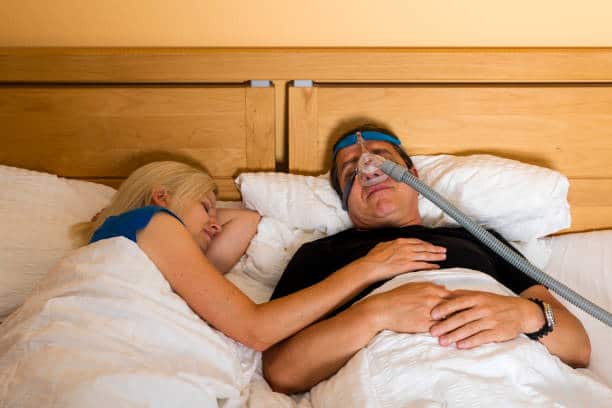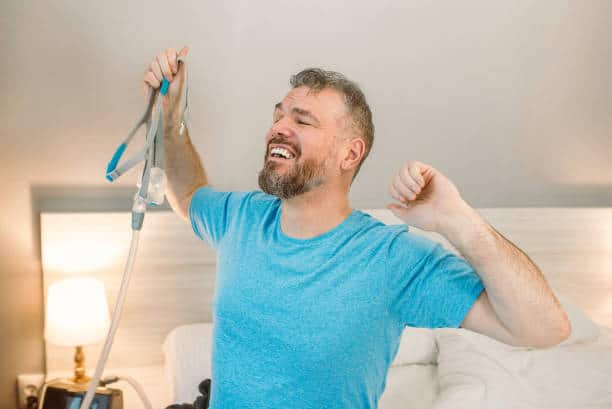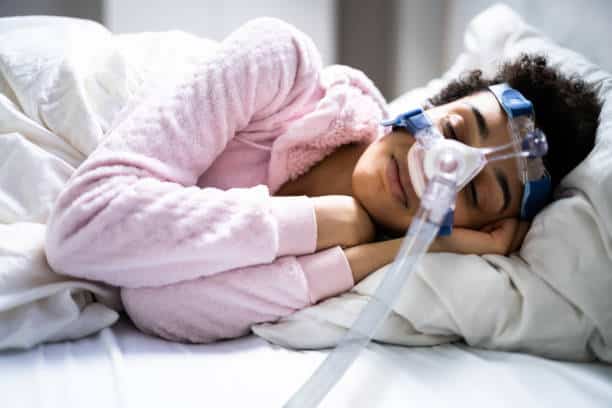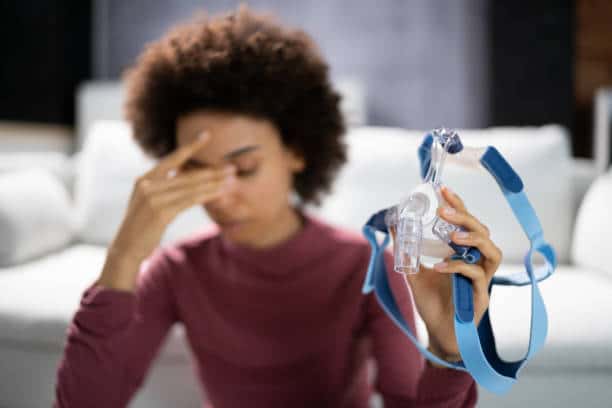Are you struggling to get a good night’s sleep? Do you suffer from sleep apnea? If so, then a CPAP machine may be the answer you’re looking for. The benefits of a CPAP machine can improve your quality of life. They are a non-invasive, safe, and effective treatment for sleep apnea.
In this article, we will cover the benefits of CPAP machines and will also inform you about its drawbacks. Additionally, we will answer some of the most frequently asked questions. Continue reading if you want to learn more.
8 Health Benefits of a CPAP machine
Greater Comfort for Your Spouse

One of the signs of sleep apnea is snoring, which can make it hard for your partner to get a good night’s sleep. When you use your CPAP machine, the pressured air helps keep your airways open, which benefits those who suffer from sleep apnea.
In addition, it stops the back of the throat from compressing and prevents the uvula, soft palate, and tongue from blocking the airway (which leads to snoring). This means that you will snore less, and your partner will get a better night’s sleep.
Fewer Headaches

A headache upon waking up is one of the most infuriating symptoms of sleep apnea. The lack of oxygen in the bloodstream can lead to throbbing pain around the brain. When there is a lack of oxygen in the body, the blood vessels expand so that there is better circulation.
However, if there is little oxygen present, the carbon dioxide regenerated in the bloodstream might irritate. Patients who experience this may find that they cannot break the cycle of headaches and migraines, waking up with headaches every morning or even being awakened during the night by their headaches.
Improve heart function
According to several studies, using a CPAP machine enhances the capacity of the heart to pump blood, which may lessen the likelihood of developing heart failure. People with heart failure may be able to improve how well their heart works with CPAP therapy.
Less Daytime Sleepiness
Sleep apnea can produce daytime sleepiness since the disorder can either cause sleep to be disrupted or diminish the total amount of time spent sleeping at night.
The condition known as daytime sleepiness occurs when a person is unusually sleepy at times when they typically feel alert and awake. Some individuals with sleep apnea develop what is known as excessive daytime sleepiness, characterized by symptoms of daytime sleepiness that continue for at least three months.
The majority of patients receiving CPAP therapy report feeling less sleepy during the day due to the treatment. Approximately 75% of those with obstructive sleep apnea who undergo CPAP therapy report a complete resolution of their daytime drowsiness symptoms. The degree of daytime drowsiness and the amount of time a person spends using CPAP are two factors that may affect how effectively the treatment works.
Therapy with CPAP for obstructive sleep apnea (OSA) may also increase daytime alertness. The preliminary research suggests that people who use CPAP may report improvements in their performance, memory, and focus.
Lower Risk Of Diabetes
Because hypoxia, or oxygen deprivation, directly impacts glucose metabolism by raising glucose resistance and inflammation, sleep apnea is connected to the development of type 2 diabetes and the worsening of the condition in people who already have it..
However, studies demonstrate that by using CPAP, glucose homeostasis can be improved, leading to lower glucose resistance levels and improved metabolism regulation. On top of that, recent research has shown that people who get treatment for sleep apnea find it much simpler to control their type 2 diabetes.
Improved concentration
If left untreated, severe cases of sleep apnea can cause tissue damage in the brain. As a consequence of this, it is challenging to focus your attention. You can also experience problems with your memory.
Your capacity to think, concentrate, and make decisions may improve using a CPAP machine. Your productivity may increase due to this, and the risk of making expensive mistakes may reduce.
Stronger Immune System
It is true what they say; getting adequate rest strengthens your immune system. Therefore when sleep apnea destroys your rest, you may become more susceptible to catching colds and viruses. During sleep, our bodies usually release T-cells to fight off infections by instructing the immune system to react. This process typically takes place while we are asleep.
Those who suffer from sleep apnea have a greater propensity to have higher rates of inflammation and fewer T-cells, making it more challenging to defend the body against hostile outside agents. If you want to avoid becoming sick from the common cold or the flu, using a CPAP and keeping the supplies it uses clean will help protect your health.
Better quality of sleep

In the battle against obstructive sleep apnea, this is undeniably one of the essential advantages of using CPAP therapy. Getting enough sleep is vital to keep one’s general health and well-being in good shape.
When it comes to improving one’s overall health and sense of well-being, the quantity of sleep one gets each night is not as important as the quality of sleep one gets during those hours.
The Drawbacks of CPAP machine
Insomnia
The CPAP therapy you’re using may cause you to have trouble going asleep or staying asleep, but it’s not for the reason you would expect.
This is not actual insomnia; instead, it is brought on by having constant positive airway pressure. Once more, you might need to reduce the air pressure settings on your device, but before making any other adjustments, you should consult your physician first.
Runny nose and Nasal Congestion
Using a saline nasal spray can help with mild nasal congestion. Increasing the humidity that is present in your gadget could be of assistance.
If your congestion, runny nose, or sneezing makes it difficult for you to use your CPAP device, you should discuss possible treatments with your primary care physician.
Strap marks or skin sores

These blemishes or sores are frequently the results of an improperly fitting mask. You can get rid of them by modifying or switching the sort of CPAP mask you are using. You can get rid of them by modifying or switching the sort of mask you are using.
Check to see that the straps on your mask are tight enough. In addition, it may be beneficial to purchase CPAP strap covers made of soft material to lessen the amount of rubbing between the straps and your skin.
Sore throat and Dry nose
Adding chilled or warm moisture to the air, a humidifier attached to your CPAP machine can alleviate symptoms such as dry noses and sore throats. It is sometimes vital to switch to different forms of CPAP masks to avoid experiencing a dry nose, mouth, or sore throat.
Conclusion
A CPAP machine can be a life-saving device for those who suffer from sleep apnea. Talk to your doctor about scheduling a sleep study if you are a candidate for a CPAP machine.
Once you have been diagnosed with sleep apnea, your doctor will likely prescribe a CPAP machine as the first line of treatment.
The 8 health benefits we’ve outlined are just some reasons why it is so important to start using a CPAP machine if you’ve been diagnosed with this condition.
While some side effects are associated with using a CPAP machine, most people find that the benefits far outweigh any negative consequences.
If you’re still unsure whether or not using a CPAP machine is right for you, schedule a discovery call with us or visit our website, CPAPwater, and we can help answer all your questions.
Frequently Asked Questions
Do CPAP machines help?
Research has shown that using CPAP equipment to treat sleep apnea is a very effective treatment. Because it is so effective in treating the illness, continuous positive airway pressure (CPAP) is frequently the first line of defense against it.
Can CPAP damage your lungs?
There is no evidence that using CPAP harms your lungs. After using CPAP, some individuals feel like they have a burning feeling in their lungs. On the other hand, this is typically the effect of breathing in the dry, chilly air. Use warm air that has been humidified instead to fix this issue.
Can sleep apnea increase blood pressure?
The sudden decreases in blood oxygen levels that take place as a result of sleep apnea can cause a rise in blood pressure and put a burden on the cardiovascular system. If you have obstructive sleep apnea, your chance of developing high blood pressure increases (hypertension).
